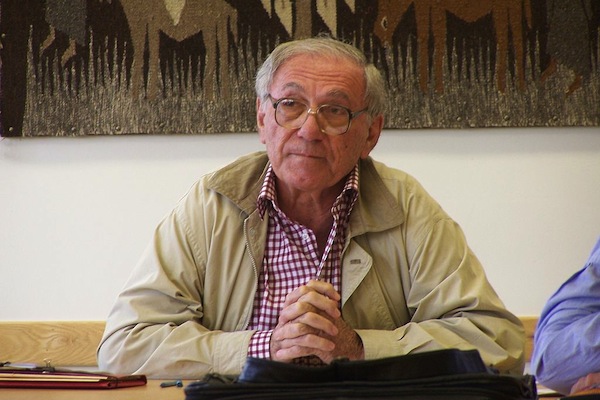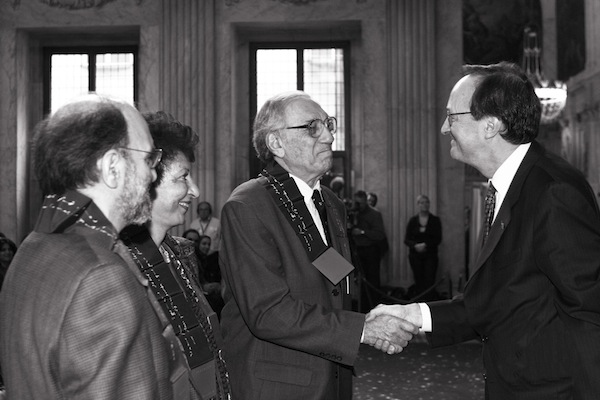Sadiq Jalal al-Azm, who passed away last week, was a Syrian intellectual of the highest order. He placed a mirror in front of both the Arab world and its tendency to blame the West for all its ills.
By Dror Ze’evi

The Arab states are in trouble. Their citizens are unable to break through the walls of prejudice, they fail to significantly contribute to the intellectual currents of the world, and women and minorities are excluded from taking part in society and the state. Arabs are trapped by ignorance and are exploited by their leaders, which make cynical use of religion. Worst of all: they are trapped in a web of lies that they themselves spun.
No, this is not a quote by Education Minister Naftali Bennett. These words were written in 1968 by Syrian philosopher Sadiq Jalal al-Azm, who passed away last week, in his book, Self-Criticism After the Defeat. Following their shock and failure in the Six-Day War, Arab leaders resorted to various conspiracy theories to justify their defeat by the Israeli army. Few dared to criticize the political order or the cultural norms of the Arab world. Al-Azm was one of the few who dared to chastise the rulers in writing.
Shortly after the war, Al-Azm published Critique of Religious Thought. Facing an authoritarian society, Sadiq criticized the use of religion as a tool for political action, as well as for inflaming the masses. Following the book’s publishing in Beirut, Sadiq and the publisher were arrested for ridiculing religion and inciting ethnic conflict. They both spent time in jail. Sadiq’s books are still banned in many Middle Eastern countries.
Al-Azm was born in Syria in 1934 to the wealthiest, most famous family in the city. His ancestors served as governors in the Damascus district — which then included Israel — in the beginning of the 18th century (their castles were known to be just as large and extravagant as their patrons in Istanbul). Al-Azm, for his part, never cared much for wealth or prestige. Upon finishing his doctorate studies, he returned to Lebanon and taught at the American University of Beirut until he was expelled to the diaspora. As a Syrian patriot he tried his entire life to live in his homeland and tell his fellow countrymen the truth. He was not deterred by persecution or the law, struggled to publish his books in Arabic, and preferred to teach at Damascus University over the jobs offered to him in prestigious universities in the West.
During my post-doctorate in the 90s, I took part in a course on the political culture of the Arab world. Very quickly, al-Azm and I developed a friendship that included fascinating and deep discussions. He asked me to give a lecture on Israeli politics, expressed his interest in Israeli culture and society, and even expressed his desire to visit. He did not hide his criticism of the Syrian regime, and specifically of the ruling Alawite class, which he viewed as lacking culture. However, this also provided him with some hope: perhaps, he wondered aloud, the need to accept an Alawite regime will push the majority of Syrians to accept the possibility of political pluralism. They may even adapt to non-Muslim rule.
At that time the academic world was overcome with debate over Edward Said’s book, Orientalism. The European West, argued Said, had always sought to construct the East — and especially the Arab and Muslim world — as the twisted, corrupt “other” to the lofty principles of the West. This social-political construct succeeded beyond imagination and was even adopted by residents of the “East” — Arabs and Muslims — giving them a distorted image of themselves.

Al-Azm rejected Said’s thesis outright. In his eyes, placing the blame on an abstract and villainous “West” was nothing more than a continuation of the internal Arab lie. Reading Said, one would think that the West distorted the image of the Arab and caused the social and political backwardness of the Middle East, and thus the responsibility lies at its doorstep. In al-Azm’s eyes, this was akin to submitting to the Arab world’s inability to take responsibility for its actions and its fate.
In the past few years, and especially since 2011, al-Azm became one of the most critical voices in favor of changing and democratizing the Syrian regime. His calls for establishing a different, more open, and democratic Syria reverberate until this day in the struggle to liberate the homeland from the grasp of Bashar al-Assad. In 2012 al-Azm was forced to flee his homeland for the final time, receiving asylum in Germany, where he passed away last week while on the operating table. Sadiq Jalal al-Azm was a brave researcher and intellectual who was unafraid of the truth. There is a dearth of people like him, both there and here.
Prof. Dror Ze’evi is a co-founder of The Forum for Regional Thinking (FORTH). He teaches and studies Ottoman social and cultural history at the Hebrew University of Jerusalem. This article was first published in Hebrew by The Forum for Regional Thinking.
